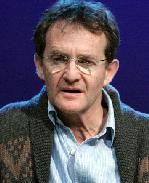SITE GUIDE
SEARCH
REVIEWS
REVIEW ARCHIVES
ADVERTISING AT CURTAINUP
FEATURES
NEWS
Etcetera and
Short Term Listings
LISTINGS
Broadway
Off-Broadway
NYC Restaurants
BOOKS and CDs
OTHER PLACES
Berkshires
London
California
New Jersey
DC
Philadelphia
Elsewhere
QUOTES
TKTS
PLAYWRIGHTS' ALBUMS
LETTERS TO EDITOR
FILM
LINKS
MISCELLANEOUS
Free Updates
Masthead
Writing for Us
A CurtainUp  London Review
London Review
 London Review
London ReviewThe Vertical Hour
|
A doctor is someone who tells you the truth and stays with you to the end.— Oliver
|

Anton Lesser as Oliver
(Photo: Keith Pattison) |
Nadia Blye (Indira Varma) is a lecturer in politics at Yale and an apologist for the war. Oliver Lucas (Anton Lesser) is an English doctor who hides away in the Shropshire countryside and condemns the violence. Nadia comes to stay with Oliver because he is her boyfriend Philip Lucas's (Tom Riley) father. Towards the end of the play, in a most articulate moment, Oliver lists the irrefutable shortcomings of American policy in Iraq from looking at the legality of the war to the lack of preparations for the peace and the disregard for casualties other than those who are Americans. Nadia replies, "It's so much easier to do nothing than something."
Interestingly for British audiences, the charismatic Bill Nighy has been replaced by a more cynical Anton Lesser, who looks not dissimilar to the playwright David Hare. I don't think anyone would find Lesser's portrayal of Oliver seductively charming although his powers of argument and analysis have a certain intellectual attraction. Indira Varma takes on the main female role of the feminist Yale lecturer. The overwhelming impression is of characters who are not especially likeable. While Oliver may express commendable anti-war sentiments, the carnage that is his personal life has left many emotional casualties and two dead people. Those damaged for life include his wife in the "open" marriage and his son Philip who spent his childhood trying to hold the peace between his parents.
There is much verbal sparring between father and son which the insidious and undermining father always wins. Philip says to his father in a telling moment, "Kids aren't meant to be the objects of satire." Like Elyse Sommer, I agree that, intellectually, I would have expected Nadia to have been more attracted to the father than the son. It is the father who persuades her to confess the reasons for her being in a relationship with physiotherapist Philip and not the riskier excitement of the war correspondent lover she met in a war zone. There was a moment in a 5am terrace scene between Nadia and Oliver when I thought their connection might progress to the physical but thank fully it didn't although they certainly seemed flirtatious. However Oliver is asking why this beautiful, intelligent woman is with Philip and this is the start of her questioning her motives which she is able to explain to her student in the final scene. "It was like I'd been revealed to myself." Oliver's motives may not have been to break up his son's relationship but the effect is the same. As the doctor, he could not resist giving his diagnosis. This is his powerplay disguised as of merit because it is truth telling.
Anton Lesser's performance is thoughtful and soured. Indira Varma copes well with the American accent and gives Nadia sincerity and insight although she isn't always sympathetic. As I left the theatre some American drama students were laughing about Nadia's description about her love for the war journalist, "He turned me inside out. Like gutting a fish. " Tom Riley as Philip plays the victim, first of his parents' marriage, then of his father's malicious wit and finally in a losing relationship with Nadia. Philip is out of his depth. Joseph Kloska and Wunmi Mosaku have cameo roles as Nadia's students.
The sets are minimal but correct; the lighting is attractive throughout and changes mood and time of day with gorgeous blues and purple. The topping and tailing of the play with the tutorial scenes at Yale nicely introduce and round off Hare's work but I question whether this play, written by a less celebrated playwright would have been sold out.
|
THE VERTICAL HOUR
Written by David Hare Directed by Jeremy Merrin With: Anton Lesser, Indira Varma, Tom Riley, Wunmi Mosaku, Joseph Kloska Design: Mike Britton Lighting: Howard Harrison Music and Sound: Nick Powell Running time: Two hours 30 minutes with one interval Box Office: 020 7565 5000 Booking to 1st March 2008 but sold out Reviewed by Lizzie Loveridge based on 29th January 2008 performance at the Jerwood Theatre Downstairs, Royal Court Theatre, Sloane Square, London SW1 (Tube: Sloane Square) |
|
London Theatre Tickets Lion King Tickets Billy Elliot Tickets Mary Poppins Tickets Mamma Mia Tickets We Will Rock You Tickets Theatre Tickets |




